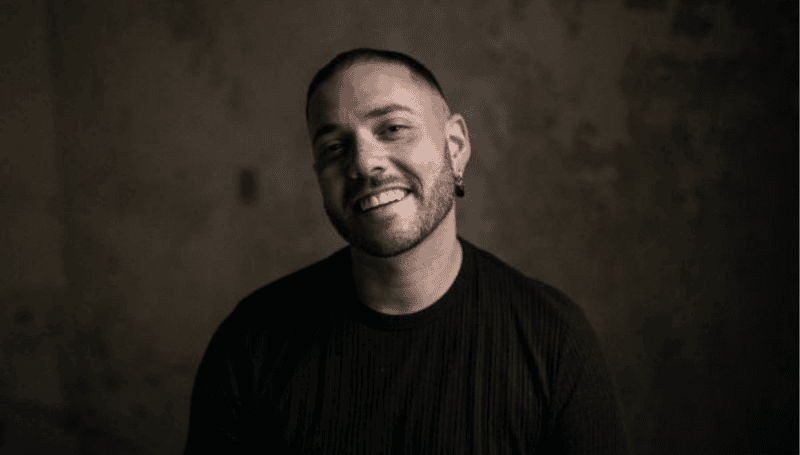©2024 Kim Kokich
When Robert Priore began teaching and choreographing at CityDance Conservatory in 2010, he was barely a few years older than its graduating students. Now, after 15 years at CityDance, when asked about what he loves about being here, he says, in addition to working with highly talented students, “There is room for me to explore, while always being lifted up. The students trust me.”
Mutual respect and trust permeate the atmosphere at CityDance Conservatory, and is at the heart of its mission to nurture talent and achievement through dance. But Priore’s early dance training wasn’t always so positive. He explains, “I was in gymnastics first… and they made a comment that I was too chubby to really be good at gymnastics, and it’s not like I got different feedback in dance… I was a really talented dancer, I just really lacked confidence. I think because I had teachers who were not like me and were very damaging…there are the good ones and the bad ones and it’s a shame, and it’s in some ways kind of hard to avoid.” But Priore overcame that initial negative experience and is grateful to his parents for being supportive throughout his artistic journey. He believes it is important, always, to remember compassion, even while teaching boundaries and the consistent discipline that dance requires.
“I really try, in particular in the past five years, to meet every student with empathy and…understand that dance is formative and dance can be so life-changing because it’s all I have.” Priore may say that’s all he has, but his skills as a teacher and artist extend beyond just putting steps together. Yes, they encompass what it means to be a dancer, but it’s not just about being a dancer. Conveying that, how it’s all about connection, means a great deal to him.
Priore says the piece he is currently teaching Conservatory students is a good example. “It’s a powerhouse contemporary work…I have 36 kids in the piece, a huge number [and it’s about] the kind of duality, two sides of the coin: loneliness and the feeling of love and connection to other people. I think that Covid really changed a lot for a lot of people.” Priore believes it’s vital to recognize and honor the way the pandemic changed the world and how people have changed because of it. “What I want the audience to take away is I want them to feel something…Now more than ever, post [Covid] that deep time of isolation they need to learn how to express themselves and to feel comfortable doing it especially if they want a career as a dancer…So what I preach to these kids is you also have to be a person. People are looking at you not just as a dancer, but as a human.”
Robert Priore was born and raised in Buffalo, New York. His mother is a creative costume designer and his father played the trumpet in addition to his day job. And like many children whose parents value the arts, he was drawn to the music he heard his parents play at home. For his father, it was the music of Chuck Mangione. For his mother, it was Etta James. He says, “I come from this lineage of amazing women, my mom and my grandmother. My mom was a stay-at-home mom until I was 12 when she became a seamstress with TOY, Theater of Youth. Schools in Buffalo would attend these performances on field trips. TOY would do shows on the weekends as well. It was like four or five shows in a season, and after two or three years she started to design…She’s retired now, but opened a Brewery in Buffalo, so I think I got that from her. I always feel like I’m recreating in some way. Every ten years…I feel like I’ve gone through a couple of phases when I’ve tried to reset and challenge myself in different ways.”
By the time Priore was 13 he was taking tumbling classes at his sister’s dance school. And that’s where he was noticed. “It was a totally great place. I took the tumbling acrobatics class and at the end of the year they said to my parents, ‘Look, we’ll give him a full scholarship, whatever he wants.” From there in high school Priore focused on performing in musical theater and when it came time to look at college, he says, “My parents, God bless them, they were kind of like ‘whatever you want. We’ll help you but you still got to take out your loans’…I had a good friend and we had grown up in competing schools but we were the same age, and he said, ‘Well I’m going to audition for this school at Point Park. You should come with me.” They went together and were admitted. He says it was a “quick, crazy decision and journey.”
After graduating, Priore found work as a dancer with Dayton Contemporary Dance Company (DCDC) and even though he had created dances in college, this was where his work took off.
It was hard, but worth it.
“My partner at the time, my best friend and I all got jobs together at Dayton Contemporary Dance Company. We were all in their second company and it was kind of like a gap year as I call it. You know it was a job but we weren’t being paid and we were all still training. It was like 30 hours a week in the evenings so I was working as a bank teller full-time Monday through Friday, And then in the evenings you rehearse all night then shows on weekends. So it was some of the hardest work that I’d ever done just because it was like Horton, mostly Horton technique, which is challenging. I felt like I started right back at the bottom of the barrel. You know you work your way up in college to kind of get to that place where you feel like, man I’ve made it, senior year, and then even though there were fewer guys there, I just felt right back at the bottom because we were new, and we were in second company, so new to the city, new to the people, new to the company, and on top of that there’s a whole roster of male dancers in first company let along the guys in the second company that had already been there a year. It was an eye-opening experience. And it was amazing…definitely a humbling experience. And the women who led the company Debbie Blunden-Diggs and Shonna Hickman-Matlock, were both super supportive of me and looking back it felt like a female figure was always in my corner everywhere I went. From DCDC to coming here, I mean Lorraine has afforded a lot of opportunities in terms of personal growth.”Robert Priore has received awards from the DC Commission on the Arts and Humanities and is the recipient of the Pola Nirenska Award from Washington Performing Arts. He has choreographed dozens of dances in the USA and internationally. We are fortunate to share his talent and expertise with CityDance Conservatory students and audiences.
————————————————————
1. Lester Iradell Horton. (1906-1953). American dancer, choreographer and teacher who created a Modern Dance Technique based on Native American dances, anatomical studies and other movement influences.
2. Pola Nirenska. (1910-1992). Polish modern dancer and groundbreaking choreographer who emigrated to the USA during World War II and became a leader in Modern Dance in the Washington, DC area.


